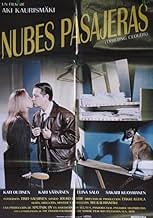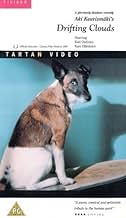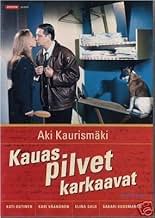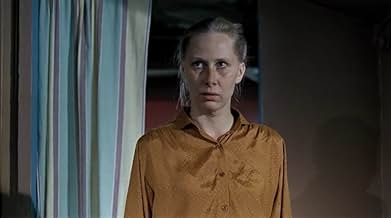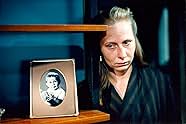IMDb-BEWERTUNG
7,6/10
10.126
IHRE BEWERTUNG
Die Rezession trifft ein Paar in Helsinki.Die Rezession trifft ein Paar in Helsinki.Die Rezession trifft ein Paar in Helsinki.
- Auszeichnungen
- 10 Gewinne & 2 Nominierungen insgesamt
Matti Pellonpää
- Child in the Photo
- (Archivfilmmaterial)
Empfohlene Bewertungen
Aside from Leningrad Cowboys Meet Moses, Aki Kaurismäki has never done any real sequels to his films (even though Shadows in Paradise featured one of the minor characters from Crime and Punishment). Drifting Clouds, the first entry in the acclaimed "losers" trilogy, was meant to be an exception, the script having been written specifically as a follow-up to Shadows. Sadly, Matti Pellonpää, who was eager to reprise his role as Nikander, died shortly before filming began, thus abruptly ending a working relationship with the director which had lasted 11 years and 8 movies (The Match Factory Girl and I Hired a Contract Killer were the only ones in which he did not appear prior to his death), prompting Kaurismäki to change the screenplay.
Nonetheless, there are still traces of the original project in the finished film, namely the characters played by Kati Outinen (who became the new protagonist of the story) and Sakari Kuosmanen, who retain the names they had in Shadows: Ilona and Melartin. They both work at a restaurant called Dubrovnik (as maitre d' and waiter respectively), under the supervision of Mrs. Sjöholm (Elina Salo). There are no major problems in the workplace, the only occasional disturbance being the alcohol-induced antics of the cook Lajunen (Markku Peltola, who later played the lead in the trilogy's second act, The Man Without a Past). Then one day Mrs. Sjöholm announces the restaurant is being handed over to a new proprietor, meaning the old staff's services are no longer required. Everyone faces unemployment their own way: Lajunen buries himself in booze ("Where are you going?" he gets asked one evening; "As far as the Kossu lasts" he replies, referring to Finland's most popular drink) and Melartin starts looking for another job, while Ilona is confident her husband's income will be enough for the two to lead a decent life. Unfortunately, Lauri (Kari Väänänen) loses his job as well, causing despair and frustration as his wife tries to come up with a solution that could satisfy everybody.
As usual, Kaurismäki depicts contemporary Finnish society with a very pessimistic eye, never once flinching away from the sadness of the situation. The high point of this is reached in Esko Nikkari's cameo, a scene drenched in cynicism and cruelly black humor where the great character actor tells Outinen (always at her best in these pictures) that once you're past the age of 30, you're completely worthless in the business world. "You're 56" she reminds him; "Yes, but I have connections" comes the painfully dry answer. It's a dramatic sequence which reflects what really goes on in the world every day, albeit filtered through Kaurismäki's peculiar view on life.
And yet, for all the misery that permeates the picture, Drifting Clouds is actually the most optimistic of the "losers" films: perhaps remembering what the movie was originally meant to be, the director fills almost every frame (minus the Nikkari scene) with gags, in order to lighten the mood. And the conclusion stands out as one of the most cheerful Kaurismäki has ever shot, maybe because that is the kind of ending in which Pellonpää, to whom the film is dedicated, would have given another of his understated, hugely affecting, unforgettable performances.
Nonetheless, there are still traces of the original project in the finished film, namely the characters played by Kati Outinen (who became the new protagonist of the story) and Sakari Kuosmanen, who retain the names they had in Shadows: Ilona and Melartin. They both work at a restaurant called Dubrovnik (as maitre d' and waiter respectively), under the supervision of Mrs. Sjöholm (Elina Salo). There are no major problems in the workplace, the only occasional disturbance being the alcohol-induced antics of the cook Lajunen (Markku Peltola, who later played the lead in the trilogy's second act, The Man Without a Past). Then one day Mrs. Sjöholm announces the restaurant is being handed over to a new proprietor, meaning the old staff's services are no longer required. Everyone faces unemployment their own way: Lajunen buries himself in booze ("Where are you going?" he gets asked one evening; "As far as the Kossu lasts" he replies, referring to Finland's most popular drink) and Melartin starts looking for another job, while Ilona is confident her husband's income will be enough for the two to lead a decent life. Unfortunately, Lauri (Kari Väänänen) loses his job as well, causing despair and frustration as his wife tries to come up with a solution that could satisfy everybody.
As usual, Kaurismäki depicts contemporary Finnish society with a very pessimistic eye, never once flinching away from the sadness of the situation. The high point of this is reached in Esko Nikkari's cameo, a scene drenched in cynicism and cruelly black humor where the great character actor tells Outinen (always at her best in these pictures) that once you're past the age of 30, you're completely worthless in the business world. "You're 56" she reminds him; "Yes, but I have connections" comes the painfully dry answer. It's a dramatic sequence which reflects what really goes on in the world every day, albeit filtered through Kaurismäki's peculiar view on life.
And yet, for all the misery that permeates the picture, Drifting Clouds is actually the most optimistic of the "losers" films: perhaps remembering what the movie was originally meant to be, the director fills almost every frame (minus the Nikkari scene) with gags, in order to lighten the mood. And the conclusion stands out as one of the most cheerful Kaurismäki has ever shot, maybe because that is the kind of ending in which Pellonpää, to whom the film is dedicated, would have given another of his understated, hugely affecting, unforgettable performances.
This colorful film from Finland's great director Aki Kaurismäki is a warm and passionate (note that passionate isn't the same in Finland as in Spain)story of two working class heroes, Illona and Lauri, with their dog and square life. They are content with their existence and are investing in new furniture and a big television set, all on a payment plan. Work is hard and they don't get much time for each other, but they have pride. Then both of them loose their jobs and their self respect with that. They're proud people and will not go on well fare. There's a economic crisis in the country and jobs are hard to find. They have to take really crummy jobs to survive but are cheated and also Lauri discovers his health isn't what it used to be. They have a few deep looks into the depth of the bottle and any signs of ever getting back are slim. Then Illona, motivated by an ex fellow worker gets a plan... This film is about survival and loss of self respect and the struggle to regain it. I find it very warm and positive. An exploration into the mind of northern Europe and the old values. A good worker needs no help, he stands tall on his own. Also the tango music in the film is wonderful in it's bittersweetness. It's a story of change, when the old reality has to be updated and the pain that can cause.
To truly understand and appreciate Kauas pilvet karkaavat (Drifting Clouds)you need to understand something of the Finnish mindset, and to understand something of the Finns I would recommend this film. Kaurismaki is able to encapsulate and embody the Finns and Finland in his work. I have lived 10 months of my life in Finland, and I was therefore able to identify immediately with this film through my experiences of Finland and the Finns themselves (my dear friends there). This film captures the sense of space that Finland itself has, the sense of space that the Finns create around themselves (Finns appear to me to be somewhat unseasy with urban and city living, hence everyone's desire to escape to a kesamokki, summer cottages at the earliest possible time) and the understated, no-BS nature of the Finns themselves, it is the only country I know where it is truly possible to have confortable silences when conversing with people.
Silent despair, brought on by the extremes of the climate, Finland's relative isolation, the social problems that DO exist there (despite being a Scandinavian country with all the images of a freedom and social support that that may conjure), the expectation of conformity that exists within such small societies, and yet the strong innate desire of every Finn to truly assert an individual identity over within the framework of this 'organised freedom' are all apparent in this film and are how I observed Finland. The 'national' sport of drinking until one passes out, particularly during the dark days of winter, and when coping with depression or despair. To any Finns out there, this is not meant to cause offense, my apologies if these comments do.
Kaurismaki's use of long shots and one takes for a sequence of action (or non-action), and the sense of time and anticipation that they create, until you realise that the anticiption amounts to nothing, which is so in line with the Finnish sense of humour. It is always difficult to generalise about a particular nation and make sweeping statements that are meant to be applicable to all who live within the confines of those national boundaries. But as a small country (in terms of population) with a closely homogenous people, these traits are quite discernable, especially with the impact that the environment and climate brings...Drifting Clouds and the Leningrad Cowboys are two sides of the same coin...
I make this disclaimer, the film is actually gloomier than life there.
Silent despair, brought on by the extremes of the climate, Finland's relative isolation, the social problems that DO exist there (despite being a Scandinavian country with all the images of a freedom and social support that that may conjure), the expectation of conformity that exists within such small societies, and yet the strong innate desire of every Finn to truly assert an individual identity over within the framework of this 'organised freedom' are all apparent in this film and are how I observed Finland. The 'national' sport of drinking until one passes out, particularly during the dark days of winter, and when coping with depression or despair. To any Finns out there, this is not meant to cause offense, my apologies if these comments do.
Kaurismaki's use of long shots and one takes for a sequence of action (or non-action), and the sense of time and anticipation that they create, until you realise that the anticiption amounts to nothing, which is so in line with the Finnish sense of humour. It is always difficult to generalise about a particular nation and make sweeping statements that are meant to be applicable to all who live within the confines of those national boundaries. But as a small country (in terms of population) with a closely homogenous people, these traits are quite discernable, especially with the impact that the environment and climate brings...Drifting Clouds and the Leningrad Cowboys are two sides of the same coin...
I make this disclaimer, the film is actually gloomier than life there.
Let Americans be Americans. Let them have their explosions, action, mainstream movie-making. Kaurismäki's film "Kauas pilvet karkaavat" is a slight parody, of course, but it contains a little Finland in it. Feelings are irrelevant, we Finns are more like Borg than "civilized" people, who can discuss about weather in every possible situation. I think everyone who comes to Finland, should see this film. It helps to understand.
10picaboo
I saw Drifting Clouds at a film festival, and I was truly blown away by the intense and true-to-life emotions this movie portrayed. Formerly being a Hollywood-action film kind of a guy, seeing Drifting Clouds has made me more open to artistic and especially foreign films. Director Kaurismaki is in my opinion one of the best directors in the world.
Wusstest du schon
- WissenswertesDedicated to the memory of Matti Pellonpää (who was frequently cast by director Aki Kaurismäki) for whom the main role was originally intended. The child who can be seen in the photo is Pellonpää, a homage.
- Zitate
Restaurant chief: [Ilona is applying a new job] To be honest, you're beginning to be too old.
Ilona: I'm 38.
Restaurant chief: You can pass away at any time.
- Crazy CreditsClosing credits begin with dedication to the late actor (and frequent collaborator) Matti Pellonpää: "Omistettu Matti Pellonpään muistolle."
- VerbindungenEdited into Välittäjä (1996)
- SoundtracksPathetique
Composed by Pyotr Ilyich Tchaikovsky (as Pjotr Tshaikovski)
Top-Auswahl
Melde dich zum Bewerten an und greife auf die Watchlist für personalisierte Empfehlungen zu.
- How long is Drifting Clouds?Powered by Alexa
Details
- Erscheinungsdatum
- Herkunftsländer
- Offizieller Standort
- Sprachen
- Auch bekannt als
- Drifting Clouds
- Drehorte
- Produktionsfirmen
- Weitere beteiligte Unternehmen bei IMDbPro anzeigen
Box Office
- Budget
- 5.562.154 FIM (geschätzt)
- Laufzeit1 Stunde 35 Minuten
- Sound-Mix
- Seitenverhältnis
- 1.85 : 1
Zu dieser Seite beitragen
Bearbeitung vorschlagen oder fehlenden Inhalt hinzufügen

